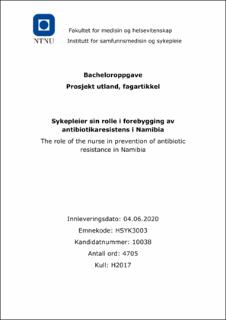| dc.contributor.advisor | Haugan, Siri. | |
| dc.contributor.author | Svinø, Hedda Borge. | |
| dc.date.accessioned | 2020-07-17T16:02:53Z | |
| dc.date.available | 2020-07-17T16:02:53Z | |
| dc.date.issued | 2020 | |
| dc.identifier.uri | https://hdl.handle.net/11250/2669571 | |
| dc.description.abstract | Introduksjon: Antibiotikaresistens er en av de største globale helseutfordringene verden står ovenfor. Det reduserer blant annet mulighetene til å behandle smittsomme sykdommer som fører til lengre sykehusopphold og høyere dødelighet. Verdens helseorganisasjon lagde i 2015 en global tiltaksplan for å håndtere denne antibiotikakrisen. Et unødvendig høyt antibiotikaforbruk, lite kunnskap og suboptimal infeksjonsforebygging er noen av de mest sentrale årsakene til at krisen har oppstått. Studien baseres på et åtte ukers praksisopphold på klinikker i Namibia. På bakgrunn av dette er hensikten med studien å undersøke hvordan sykepleier på offentlige sykehus i Namibia kan bidra til forebygging av antibiotikaresistens.
Metode: Det har blitt utført fire kvalitative semistrukturerte intervjuer og flere ustrukturerte observasjoner ved flere avdelinger på to offentlige sykehus i Namibia. Datainnsamlingen ble gjennomført over en tidsperiode på åtte uker, og senere analysert ved hjelp av en kvalitativ innholdsanalyse.
Resultater: Resultatene viser at informantene i studien har kunnskap rundt infeksjonsforebygging, men de påvirkes i stor grad av lite ressurser. Det oppleves som at det er lite tverrfaglig samarbeid mellom sykepleier og lege og at sykepleiers legemiddelutdeling ikke er optimal. Informasjon til pasienter fremstår som noe mangelfull.
Konklusjon: Hensikten med studien var å se på hvordan sykepleier i Namibia kan bidra til forebygging av antibiotikaresistens. Studiens funn viser at det finnes tiltak som kan bidra til akkurat dette. Følgende tiltak betraktes som de mest sentrale; økt infeksjonsforebygging, bidra til mer riktig bruk av antibiotika og å gi god informasjon til pasienter om antibiotika. Sykepleieryrket i Namibia preges av ressursmangel og underbemanning, noe som kan gjøre noen av tiltakene krevende å iverksette og gjennomføre. En sykepleier som jobber på et offentlig sykehus i Namibia kan være med på å forebygge antibiotikaresistens, men det er en utfordrende og stor oppgave. | |
| dc.description.abstract | Introduction: Antibiotic resistance is one of the biggest global health challenges the world is facing. Among other things, it reduces the possibility of treating infectious diseases that lead to longer hospital stays and higher mortality. In 2015, the World Health Organization created a global action plan to deal with the crisis. A high and unnecessary use of antibiotics, a lack of knowledge and suboptimal prevention of infections are some of the most important causes of the crisis. This study is based on an eight-week practice stay from the clinics in Namibia. The purpose of this study is therefore to investigate how nurses in public hospitals in Namibia can contribute to the prevention of antibiotic resistance.
Method: Four qualitative structured interviews and several unstructured observations have been conducted in several wards at two public hospitals. The data collection was conducted over a period of eight weeks, and later analysed using a qualitative content analysis.
Results: The results show that nurses in Namibia have fairly good knowledge about infection prevention, but they are heavily affected by lack of resources. It seems like there is limited interdisciplinary collaboration between the nurses and the doctors, in addition to the fact that it seems like the nurse's drug distribution is suboptimal. Information to patients is also inadequate.
Conclusion: The purpose of the study was to investigate how nurses in Namibia can contribute to prevention of antibiotic resistance. The results of the study show that there are actions which can contribute to this. The following actions are considered as the most relevant; increased prevention of infections, contribute to a more proper use of antibiotics and to give appropriate information to patients concerning antibiotics. On the other hand, nurses in Namibia are affected by a lack of resources and poor employment, which can make the actions challenging to implement. Nevertheless, a nurse working at a public hospital in Namibia has the possibility to contribute to preventing antibiotic resistance, but it is a huge and challenging task. | |
| dc.publisher | NTNU | |
| dc.title | Sykepleier sin rolle i forebygging av antibiotikaresistens i Namibia. | |
| dc.type | Bachelor thesis | |
